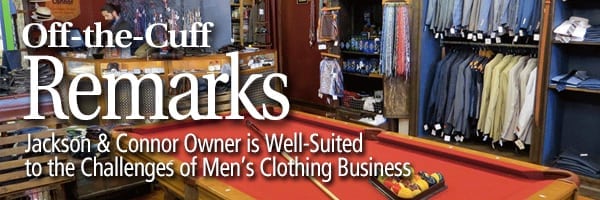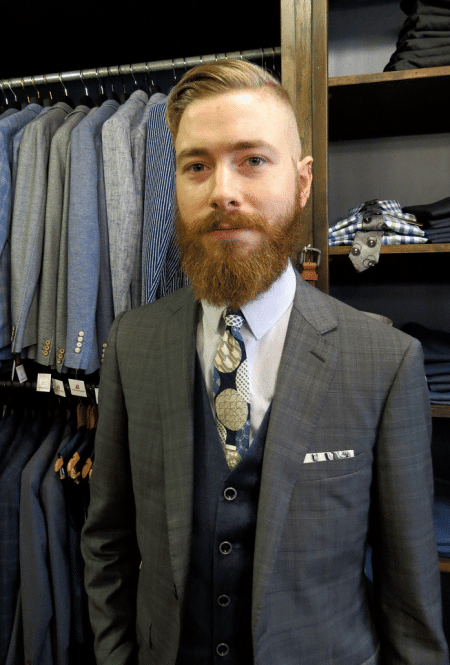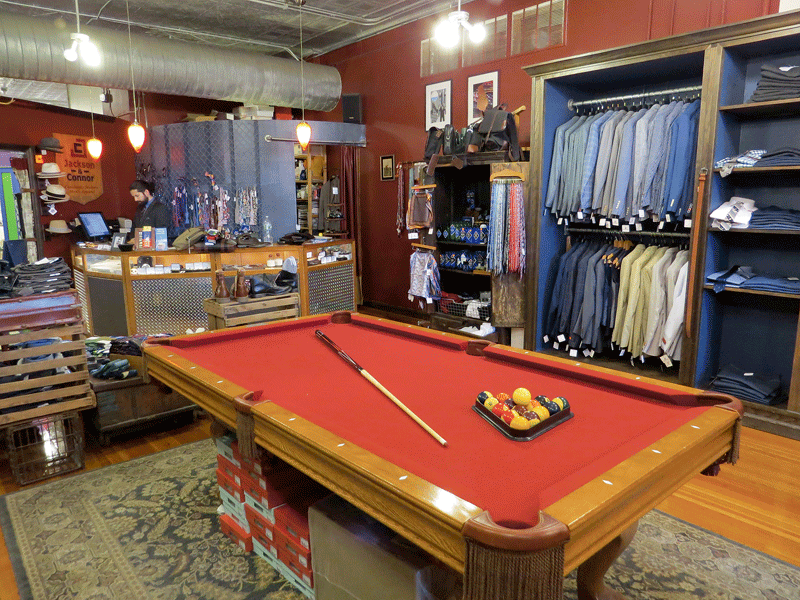
Jackson & Connor Owner Is Well-suited to the Challenges of Men’s Clothing Business
Off-the-Cuff Remarks

Owner Will Brideau
‘Safely quirky.’ Those are two words that generally don’t come together in a sentence. But Will Brideau uses the phrase often as he describes the products — and the mindset — at the men’s clothing store Jackson & Connor. This quality, if you will, is one of the reasons why the establishment continues to flourish despite sea changes, and rough water, within this sector.
‘Circumspect.’
That was the term Will Brideau chose — after giving the matter some considerable thought — when asked to describe consumers in this region and especially those in the market for men’s clothing.
Webster lists a number of synonyms for that word — including ‘prudent,’ ‘careful,’ ‘guarded,’ and ‘wary’ — and Brideau used all or most of them as he offered his answer to that question and, while doing so, explained the basic mindset at Jackson & Connor, the men’s clothing store in Northampton he’s owned since 2013.
Actually, what he said is that people in this market are “more circumspect,” with the implication being that all or most men’s clothing buyers are somewhat careful. But there was an important caveat as well.
We are a little more cautious here, but the thing that has delighted and surprised me is that, while being cautious, people are generally veering toward the more exciting and the more lively.”
“We are a little more cautious here,” he noted. “But the thing that has delighted and surprised me is that, while being cautious, people are generally veering toward the more exciting and the more lively.”
With that, Brideau, who became owner after working at the store for several years and studying (his term) under founders Tara Tetreault and Candace Connors, hit upon his primary mission. That would be effectively serving those who are cautious about their clothing investments — and he would stress repeatedly that this is what people are making — but also looking for the exciting and more lively. And this is an inexact science, to be sure.
“We go for ‘safely quirky,’” he explained, summoning a phrase he’s no doubt used frequently to describe what he sells. “It’s outside the normal. It’s not super basic, but something outside the ordinary, but not costumey; something that’s going to get you noticed and is going to be interesting, but doesn’t prompt someone to say, ‘Halloween isn’t until October, buddy.’”
Achieving all of this, and thus mastering how to serve the circumspect customer, has been a key focal point of a learning experience that Brideau says is very much ongoing, and won’t ever end, really. That’s because change, as it is in so many other business sectors, is a constant in this realm.
“I’m still learning — I learn new stuff every single day I’m in the store, which is part of the joy of it for me,” he explained. “It always keeps me on my toes and keeps me active in trying to discover new things.”
Actually, there are a number of forces keeping Brideau on his toes these days. Indeed, this is an intriguing, and quite challenging, time to be in men’s clothing — and retail in general.
A trend toward more casual clothing in the workplace continues, and many would say it is accelerating, with even bankers and lawyers eschewing suits and especially ties for designer jeans and flannel jackets.
Meanwhile, online shopping continues to grow in popularity, especially as Amazon and other outlets make it increasingly simple to return shoes and clothes that don’t fit perfectly and swap them out for items that do.
But Brideau says he believes the pendulum is swinging back on formal attire, and the all-important Millennial generation is a big factor in that equation. Meanwhile, locally, a thinning of the herd when it comes to men’s clothing stores — Williamson’s in Chicopee was the latest of several establishments to close their doors — has created ample opportunities.

Jackson & Connor owner Will Brideau says he believes the pendulum is starting to swing back when it comes to workplace attire, which bodes well for his venture.
For this issue, BusinessWest talked at length with Brideau about how he intends to maximize those opportunities, while continuing to provide clothes in the category of ‘safely quirky.’
Ownership Material
As he offered BusinessWest both a quick tour of the store and some insight into how its shelves and racks are stocked, Brideau stopped at the pool table in the center of the room, a fixture since the establishment opened nearly a decade ago and an effective display area.
There, a sales associate was tying a colorfully patterned tie onto an equally colorful shirt chosen for special showcasing. There is a method to such work, noted Brideau, who’s done it for years, noting that it involves everything from effectively bringing out colors in both the shirt and the tie to spotlighting some of the 70-odd lines of clothing the store features.
“It’s a learned skill,” said Brideau. “Once you get a feel for it, it gets easier.”
The same can be said for just about every aspect of this business, he went on, adding that he can speak from experience on this topic — quite literally.
Indeed, Brideau said he knew almost nothing about the business of men’s clothing when he first walked into Jackson & Connor, the latest in a line of men’s clothing stores in that location on the second floor at Thornes Marketplace, back in 2010. And it wasn’t a long walk, to be sure.
At the time, Brideau was working just a few doors down, at Impish, where he sold strollers, children’s car seats, and related items. He said his first several visits to Jackson & Connor were purely as a customer, or window shopper, only there are no windows at this store.
“I would spend all of my time on break over at Jackson & Connor looking at all the stuff; I would drool over the pocket watches,” he recalled, adding that eventually the nature of the visits changed — or at least they took on an added dimension, one of potential employment.
“I would ask if they needed any part-time help,” he went on, adding that he lost a second job he had when the company in question closed, and he was aggressive and imaginative in his quest to replace it. “I knew absolutely nothing about men’s clothing, not the first thing. But I walked in there and said, “I love this store, I love everything in it, I don’t have any knowledge about this stuff, but if you ever wanted to hire anyone part-time, I’d love to work for you.”
“They said they’d think about it,” he continued, adding that this scenario would repeat itself several times before Tetreault and Connors finally took on Brideau as their first and only employee, thus beginning that ongoing learning experience he described earlier.
It nearly ended a few years later, when the partners pulled Brideau aside and told him they had plans to close the store — not because it wasn’t doing well, but because both of the owners essentially wanted to do something else.
The subject of the conversation eventually shifted to the prospect of Brideau buying the store from them, a proposition he initially shrugged off as unrealistic — although he was soon set straight.
“I told them I had neither the money nor the skill set to do that,” he recalled. “And they said, ‘you have the enthusiasm for menswear, and you can’t teach that; the running of the business is procedural — you learn how to do that job. The rest of it will come — if you’re passionate about it, if you care about it, if you love what you’re doing, that’s what’s most important.’”
Brideau conducted some introspection and concluded that he could check all those boxes, and so began his transformation from employee to owner.
“It was the best of all possible worlds — they wanted to get out, and I wanted to get in,” he explained. “I was just in the right place at the right time with the right opportunity and the right people to help me out and give me a chance.”
And, just as Tetreault and Connors said, the proverbial ‘rest’ as it pertains to managing the business has come. And the learning process continues as he guides the company to continued growth — sales have improved each year since he acquired the company — and new ventures such as a Jackson & Connor private label out on everything from ties to pants.
“The buying is the area where I think the learning curve keeps extending,” Brideau explained. “It’s so interesting to me. The more I buy for the store, the more I feel it becomes more complex and more interesting. That’s where I see a lot of exciting potential for the store — bringing in new lines, phasing out old ones that people are tired of, keeping things fresh, and keeping people interested.”
In other words, effectively serving customers who are, among other things, circumspect, while also dealing with the many seismic forces shaping this industry at the moment.
All this remains a labor of love for Brideau, who wears his passion on his sleeve — and on the vest and gray suit he was wearing the day he spoke with BusinessWest.
Patterns in the Market
As he talked about the art and science of buying for a shop like his these days, Brideau said the task is complicated even further by his clientele mix.
People are looking at these as investments — it’s that kind of thought process. You don’t need a suit until you need a suit, and when you need one, you don’t always have a week to 10 days to special-order one and then another week to 10 days to get it tailored.”
To say it’s broad would be an understatement, with customers ranging in age from roughly 35 to 65 (meaning mostly professionals) with a wide range of tastes and, well, persuasions, if you will. Indeed, some of his customers — in fact, a growing number of them — are not men.
“Increasingly, I’m drawing customers from the LGBTQ community who are looking to dress nicely, don’t feel comfortable wearing women’s stuff, and appreciate the construction and the quality we’re really fortunate to have in menswear,” he explained. “It’s a hallmark of the industry that this stuff is meant to be more of an investment; it’s not fast fashion. And men’s clothing was meant to be tailored — it’s not ‘here’s your medium … good luck.’ Men’s clothing gives people more control over how you present yourself to the world, which is invaluable.”
So one size doesn’t fit all, and one style doesn’t fit all, either, he went on, which makes his buying trips to New York, Las Vegas, and Boston every six months even more challenging — and fun.
As for the trend toward more casual clothes in the workplace, Brideau said that movement is definitely real and ongoing, and anecdotes abound about professionals leaving ties in the closet because they don’t need them with the golf shirts and other types of casual attire they’re wearing to the office.
Brideau had one of his own. “One of my former employees went to work in IT,” he noted. “And one of his first comments when he got that job was, ‘Will, one of these guys doesn’t even wear a belt — forget about a collared shirt or a tie or a jacket.’
“Things have changed a lot when it comes to how people dress for work, and it is what it is,” he went on, channeling his inner Bill Belichick, before offering the opinion, as well as the hope, that the pendulum is in fact swinging back in the other direction, and Millennials are a big part of the reason for that.
“People are starting to invest a little more in suits, particularly having one, two, or maybe three suits that fit you really nicely and that you can break apart and wear as a jacket,” he explained. “You can wear it to a funeral, a wedding, a graduation, a party. Also, people who are getting married now are wearing suits instead of tuxes, because they want to buy something they’re actually going to be able to wear after the fact.
“People are looking at these as investments — it’s that kind of thought process,” he went on. “You don’t need a suit until you need a suit, and when you need one, you don’t always have a week to 10 days to special-order one and then another week to 10 days to get it tailored.”
Beyond these practical sides to the equation, there is some — or more, to be more precise — thinking along the lines of the phrase ‘fashion statement,’ Brideau told BusinessWest, which he has seen anecdotally, and which bodes well for this business.
“That approach to clothing, the ‘what I wear actually does matter, and the way I dress myself really changes the way that other people interact with me in the world’ … we’re seeing a lot more of that lightbulb going off in people’s heads,” he explained. “And that’s fun for us to watch. People will come out of the dressing room, they’re wearing a nicely tailored suit and crisp white shirt that fits them properly, and a tie with a more modern width, and they say, ‘cool, I look great.’
“Witnessing those moments, seeing those faces, is where we get our enjoyment in this job,” he went on. “Seeing that transformation is rewarding, and we’re seeing it a lot more.
Vested Interests
As he wrapped up his tour of the store, Brideau referenced some new lines of ties and how well they were doing from a sales-performance perspective.
This success makes Jackson & Connor somewhat of an outlier within the industry, he explained, because the tie has really taken a hit in the workplace and almost everywhere else these days.
“I think our success stems from the fact that we carry really unusual ties, items you can’t find anywhere else,” he explained. “It’s either fabrics that literally do not exist anymore — they were made 50 or 60 years ago — or patterns you don’t come across at most other shops that have mostly solids and basics. We tend to really focus on things that are weird and outside the normal.”
But still within that category of ‘safely quirky,’ two words that go a long way toward explaining why this establishment is well-suited, in every sense of that phrase, to succeed in an ever-more-challenging marketplace.
George O’Brien can be reached at [email protected]






